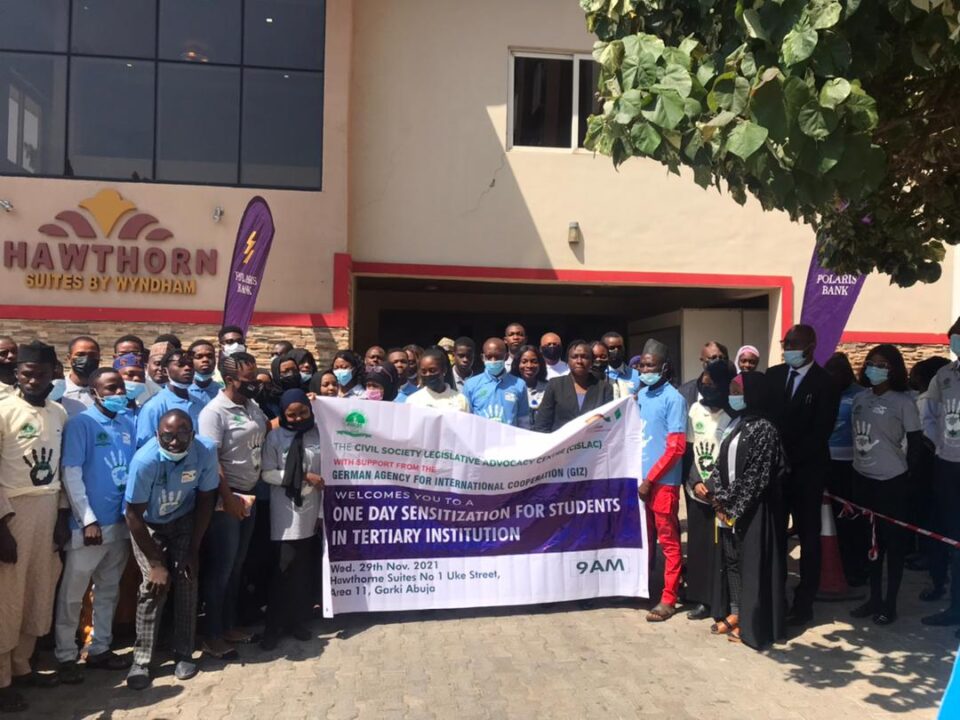Civil Society Legislative Advocacy Centre (CISLAC) has charged tertiary institutions across Abuja to speak up on cases of sexual exploitation.
The Executive Director of CISLAC, Auwal Musa (Rafsanjani) who was represented by CISLAC’s Communications and Organisational Development Manager, Emir Suljovic said that the sensitisation for tertiary institutions in Abuja Monday is one of the activities outlined towards the implementation of the Sextortion Project that CISLAC is currently implementing with support from the German Agency for International Cooperation.
According to him, it is in line with one of Nigeria’s commitments under Open Governance Partnership (OGP), to support victims and witnesses of corrupt practices.
He said that CISLAC has created a trusted electronic channel which is called TIMBY App and physical complaint and reporting channels for people to pursue psychological support and redress.
“We have brought all you students of various tertiary institutions across Abuja to enlighten and educate you on the issue of sexual exploitation (Sextortion) in tertiary institutions in Nigeria from the anti- corruption perspective, encourage you to speak out, seek redress and psychological support,” he said.
He said that, “Transparency International defines corruption as the abuse of entrusted power for personal gain. It can be defined as grand, petty and political depending on the peculiarity of each case.
“Not all forms of corruption include or involve money and that is where sexual exploitation falls.”
The Executive Director added that according to a UNODC (2020) survey1, 41 % of both men and women think that ‘body currency’ – the exchange of sex in return for preferential treatment – happens very frequently in Nigeria.
“Another 30 % are convinced that it happens frequently. Most victims and survivors of sextortion (termed “body currency” in Nigeria) are unable or reluctant to speak out,” Rafsanjani said.
He further said that Nigerian universities in particular are considered as extremely abusive towards young women seeking education. This, he said, does not negate the fact that there are also young men who experience such abuse/harassment.
“So, the stereotype by society that females are the only victims of sextortion should be reconsidered because there are situations even though not so prevalent where males have been victims. Also, there are situations where the female students are the ones who approach the lecturers and offer sex in exchange for favors.
“In 2016, the Nigerian Senate introduced the “Sexual Harassment in Tertiary Education Institution Bill” as a strategy to criminalize various acts of sextortion in Nigerian tertiary institutions but it is yet to be passed into law.
“There are however, other laws that address the issue of sexual harassment and bribery. Some of such laws include the VAPP Act, Criminal Code, Penal Code and ICPC Act,” he added.
Rafsanjani said that Nigerians are not aware of their fundamental rights and as such, cannot tell when it is violated or know where to go seeking redress. Also, the fear of stigmatization by society which is very common and the fact that perpetrators are mostly high profile individuals who are either lecturers or non-academic staff who have some level of influence or power within the institution and the society makes a lot of victims reluctant to report or speak out. There is distrust for the system, they are unsure if they will get justice or the necessary redress.
“While the seriousness of the foregoing continues to stare and confront us as a people, for reasons which have been linked to a connivance of certain surmountable factors.
“There is a need for students in tertiary institutions in Nigeria to understand their rights and also speak out while school management, anti- corruption agencies and other relevant institutions of government commit to and exhibit accountability, transparency and integrity towards putting mechanisms in place for addressing the issue which includes criminalizing sextortion and providing sanctions for perpetrators,” he further said
Manacy Titus, a student from College of Education Zuba speaking, stated that sexual harassment is what both male and female pass through, while expressing happiness for being a part of such an informative sensitisation.“My eyes are now open to educate my younger ones and those ahead of me on how to detect some of the gestures of sexual harassment,” he said.
He also said the sensitisation has taught him that sexual harassment happens irrespective of age or gender
Another student of Base University, Ufuoma told newsmen that “sextortion” is underrated as many feel it is more prominent in public school.
She further said that the problem of sextortion is one that should be solved by both students and administrators, especially with the technology (TIMBY App) introduced.
“We would go on and spread our takeaway from this sensitisation with members of our school, administrators and everyone to know that “sextortion” is a problem that needs a remedy, a drug so that it can be as much as possible reduced to the least and nonexistent state as possible in our schools and to other parts of the society



